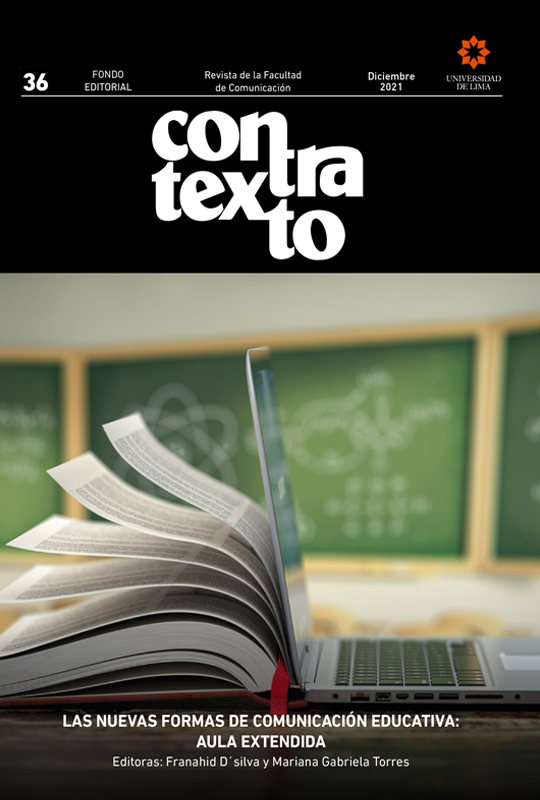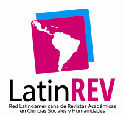Discipline, governmentality, and virtuality in the extended classroom: notes from Aprende en casa, the mexican educational strategy in the face of the COVID-19 pandemic
DOI:
https://doi.org/10.26439/contratexto2021.n036.5215Keywords:
governmentality, school apparatus, subjectivation, subjection, virtualityAbstract
The structure of this essay consists of three sections. The first section refers to the historic weaving that has refined the new corrective technologies of the individual. The second section conceives a critical perspective of the school by comparing it with an industry that produces tame students with manipulable moralities. The third section exemplifies how, even in the extended classroom, the restraint and subjectivation devices of these corrective technologies of the student not only continued to manifest but when imbricated with authority in the family context, seem to increase. In addition, all the sections have been sustained in the sense of some critical student and teachers’ perspectives of what was (and still is), exercising their professional practice living those formative processes from the Aprende en Casa strategy. Furthermore, the sensation, maybe shared, of having lost the essential space for learning accomplishments: school and its classrooms.
Downloads
References
Butler, J. (2001). ¿Qué es la crítica? Un ensayo sobre la virtud de Foucault. Transversal Texts. https://transversal.at/transversal/0806/butler/es
Castro-Gómez, S. (2010). Historia de la gubernamentalidad. Razón de Estado, liberalismo y neoliberalismo en Michel Foucault. Siglo del Hombre.
Castro Orellana, R. (2005). Foucault y el saber educativo (tercera parte: el nacimiento de la disciplina). Diálogos Educativos, 10(5), 11-22. http://www.umce.cl/~dialogos/n10_2005/castro.swf
Consejo Nacional de Evaluación de la Política de Desarrollo Social. (2020). Medición de la pobreza en México. https://www.coneval.org.mx/Paginas/principal.aspx
Deleuze, G., y Guattari, F. (1997). Mil mesetas. Capitalismo y esquizofrenia (3.a ed.). Pre-Textos.
Durkheim, É. (1988). Las reglas del método sociológico y otros escritos sobre filosofía de las ciencias sociales. Alianza Editorial.
Estrada Avilés, J. C. (2002). El derecho a la intimidad y su necesaria inclusión como garantía individual. Órgano Informativo de la Comisión de Derechos Humanos del Estado de México, 57(9), 1-14. http://www.ordenjuridico.gob.mx/Congreso/pdf/86.pdf
Foucault, M. (1984). La ética del cuidado de sí como práctica de la libertad. Concordia. Revista Internacional de Filosofía, 6, 99-116 https://revistas.unc.edu.ar/index.php/NOMBRES/article/view/2276/1217
Foucault, M. (1990). Tecnologías del yo y otros textos afines. Paidós.
Foucault, M. (1992). Microfísica del poder. La Piqueta.
Foucault, M. (2002). Vigilar y castigar: nacimiento de la prisión. Siglo XXI Editores.
Foucault, M. (2006). Seguridad, territorio, población. Fondo de Cultura Económica.
Foucault, M. (2007). Nacimiento de la biopolítica. Fondo de Cultura Económica.
Freitas de Macedo, L. (2012). La biopolítica como política de la angustia. Virtualia, 25, 1-4. http://www.revistavirtualia.com/storage/articulos/pdf/4MFJH23joTM1wnD6J0rlxPZtzfT7t5H5uUBVSJ8Y.pdf
Han, B.-C. (2014). En el enjambre (R. Gabás, Trad.). Herder.
Instituto Nacional de Estadística y Geografía. (2018). Encuesta Nacional de Ingresos y Gastos de los Hogares 2018. https://www.inegi.org.mx/programas/enigh/nc/2018/
Lemke, T. (2017). Introducción a la biopolítica. Fondo de Cultura Económica.
Lloyd, M. (2020). Desigualdades educativas y la brecha digital en tiempos de COVID-19. En H. Casanova Cardiel (Coord.), Educación y pandemia: una visión académica (pp. 115-121). Universidad Nacional Autónoma de México, Instituto de Investigaciones sobre la Universidad y la Educación.
Organización de las Naciones Unidas para la Educación, la Ciencia y la Cultura. (2 de abril del 2020). El coronavirus-19 y la educación superior: impacto y recomendaciones. https://www.iesalc.unesco.org/2020/04/02/el-coronavirus-covid-19-y-la-educacion-superior-impacto-y-recomendaciones/
Patarroyo Rengifo, S. (2012). El neoliberalismo y el imperativo empresario de sí mismo. Revista Observaciones Filosóficas, 14, 1-20. http://www.observacionesfilosoficas.net/neoliberalismoybiopoliticafoucacult.htm
Revel, J. (2009). Diccionario Foucault. Nueva Visión.
Salama, P. (2021). Contagio viral, contagio económico: riesgos políticos en América Latina. CLACSO.
Secretaría de Educación Pública. (2015). Diagnóstico ampliado del programa de la Reforma Educativa U-O82. https://www.coneval.org.mx/Informes/Evaluacion/Diagnostico/Diagnostico_2015/SEP_U082.pdf
Urraco-Solanilla, M., y Nogales-Bermejo, G. (2013). Michel Foucault: el funcionamiento de la institución escolar propio de la modernidad. Anduli. Revista Andaluza de Ciencias Sociales, 12, 153-167. https://institucional.us.es/revistas/anduli/12/art_9.pdf
Veiga-Neto, A. (2013). Biopolítica, normalización y educación. En M. Ruvituso (Ed.), Cuadernos de pensamiento biopolítico latinoamericano 1. Actas del III Coloquio de Biopolítica y I Coloquio Internacional de Biopolítica y Educación (pp. 10-19). Editorial Universitaria.
Welsh, I. (2009). Si te gustó la escuela, te encantará el trabajo. Anagrama. (Trabajo original publicado en el 2007)
Downloads
Published
Issue
Section
License
All of the works published are licensed under a CC BY 4.0 Creative Commons Attribution license. (updated on March 1st 2021)
The content of the journal may be shared in any material or format. The content may be adapted, contributed upon and transformed. Both possibilities are only permitted in so far as they complete the following conditions:
- Attribution: Credit must be given where it is due, a link to the license must be provided and changes, if made, must be indicated. This should be done in the manner deemed appropriate, without suggesting that the licensor promotes you or your use of the material.
Ownership rights
The patrimonial rights for Contratexto are published under a Creative Commons BY 4.0 license, allowing authors to keep the patrimonial rights to their work without restrictions.
If a work published in Contratexto were to be copied, distributed, spread, or any other activities contemplated in the aforementioned license, the author(s) and the journal must be mentioned visibly and expressly.
Self-archive
This journal allows and encourages authors to post items submitted to the journal on personal websites or institutional repositories both prior to and after publication, while providing bibliographic details that credit, if applicable, its publication in this journal.





















